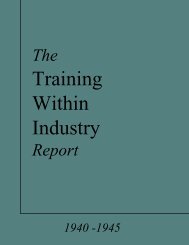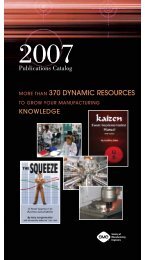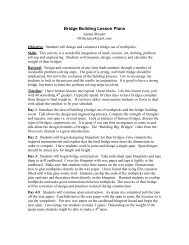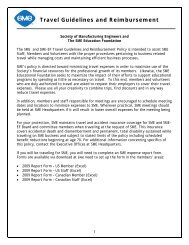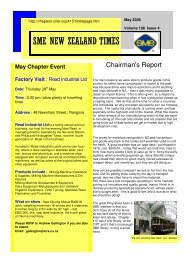Training Within Industry in the United States by Channing R. Dooley
Training Within Industry in the United States by Channing R. Dooley
Training Within Industry in the United States by Channing R. Dooley
Create successful ePaper yourself
Turn your PDF publications into a flip-book with our unique Google optimized e-Paper software.
TRAINING WITHIN INDUSTRY IN THE UNITED STATIfS 171<br />
special needs of a plant, and made "our bus<strong>in</strong>ess is different" concepts<br />
clear <strong>in</strong> relation to basic needs of all supervisors. The statement,<br />
which has become part of T.W.I. th<strong>in</strong>k<strong>in</strong>g and publications,<br />
reads as follows:<br />
(1) Knowledge of <strong>the</strong> Work - materials, tools, processes, operations, products<br />
and how <strong>the</strong>y are made and used.<br />
(2) Knowledge 01 Responsibilities - policies, agreements, rules, regulations,<br />
schedules, <strong>in</strong>terdepartmental relationships.<br />
These two knowledge needs must be met currently and locally <strong>by</strong> each plant<br />
or company.<br />
Such knowledge must be provided if each supervisor is to know his job and<br />
is to have a clear understand<strong>in</strong>g of his authority and responsibilities as a part of<br />
management.<br />
(3) Skill <strong>in</strong> Instruct<strong>in</strong>g - <strong>in</strong>creas<strong>in</strong>g production <strong>by</strong> help<strong>in</strong>g supervisors to<br />
develop a well tra<strong>in</strong>ed work forcewhich will get <strong>in</strong>to production quicker and have<br />
less scrap. rework and rejects, fewer accidents, and less tool and equipment<br />
damage.<br />
(4) Skill <strong>in</strong> Improv<strong>in</strong>~ Methods - utilis<strong>in</strong>g materials, mach<strong>in</strong>es, and manpower<br />
more effectively <strong>by</strong> mak<strong>in</strong>g supervisors study each operation <strong>in</strong> order to<br />
elim<strong>in</strong>ate, comb<strong>in</strong>e, rearrange, and simplify details of <strong>the</strong> job.<br />
(5) Skill <strong>in</strong> Lead<strong>in</strong>g - <strong>in</strong>creas<strong>in</strong>g production <strong>by</strong> help<strong>in</strong>g supervisors to improve<br />
<strong>the</strong>ir understand<strong>in</strong>g of <strong>in</strong>dividuals, <strong>the</strong>ir ability to size up situations, and<br />
<strong>the</strong>ir ways ol work<strong>in</strong>g with people.<br />
These three skills must be acquired <strong>in</strong>dividually. Practice and experience <strong>in</strong><br />
us<strong>in</strong>g <strong>the</strong>m enable both new and experienced supervisors to recognise and solve<br />
daily problems promptly.<br />
<strong>Tra<strong>in</strong><strong>in</strong>g</strong> <strong>With<strong>in</strong></strong> <strong>Industry</strong> assisted companies <strong>in</strong> giv<strong>in</strong>g <strong>the</strong>ir<br />
supervisors a start <strong>in</strong> acquir<strong>in</strong>g thcse skills through <strong>the</strong> three tenhour<br />
programmes <strong>in</strong> job <strong>in</strong>struction, job methods and job relations.<br />
Gell<strong>in</strong>g lhe Suflport ~f Managemenl.<br />
The tra<strong>in</strong><strong>in</strong>g man must conv<strong>in</strong>ce management of thc practical<br />
utility of planned tra<strong>in</strong><strong>in</strong>g <strong>in</strong> <strong>the</strong> solution of management's most<br />
urgent problenls. If executives are concerned about products that<br />
fail to pass <strong>in</strong>spection, about goods that customers are reject<strong>in</strong>g, a<br />
plan to improve quality <strong>in</strong>terests <strong>the</strong>m. If top management is<br />
<strong>in</strong>terested <strong>in</strong> costs, a way to reduce costs gets attention. The active<br />
support of top management must be ga<strong>in</strong>ed if a tra<strong>in</strong><strong>in</strong>g plan is<br />
to be successful. Interest is not enough, acceptance is not enough.<br />
A genu<strong>in</strong>ely good tra<strong>in</strong><strong>in</strong>g programme mean5 that l<strong>in</strong>e operat<strong>in</strong>g<br />
people have identiticd problems, have helped to plan <strong>the</strong> specific



